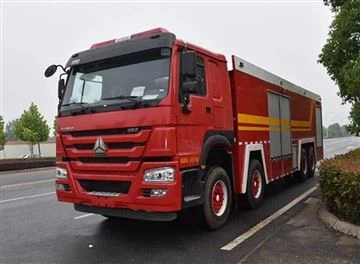Ultimate Guide to Garbage Truck Sales: Everything You Need to Know

The demand for garbage trucks has surged due to increasing urbanization and the growing emphasis on waste management. Buying or selling garbage trucks is a specialized niche with specific requirements and market dynamics. In this comprehensive article, we will explore the ins and outs of garbage truck sales, offering insights, tips, and practical examples to help you navigate this sector effectively.
Understanding Garbage Trucks
What Are Garbage Trucks?
Garbage trucks are specialized vehicles designed to collect waste and recyclables. They come in various types, including rear loaders, front loaders, side loaders, and automated vehicles.
Types of Garbage Trucks
- Rear Loaders: Typically used for residential waste collection. They load garbage from the rear and have a low capacity.
- Front Loaders: Ideal for commercial waste collection. These trucks have a front-mounted bin and are efficient for larger loads.
- Side Loaders: Equipped to pick up bins from the side, they are space-efficient and can often operate autonomously.
- Automated Trucks: These are equipped with robotic arms to collect waste without manual labor, improving safety and efficiency.
Market Overview of Garbage Truck Sales
Current Trends in the Garbage Truck Market
The garbage truck sales market has shifted towards more eco-friendly and automated options. Many municipalities are investing in electric garbage trucks to reduce emissions, while others are looking into automation technology to increase efficiency.
Market Demand and Growth
According to industry reports, the garbage truck market is expected to grow significantly. Increased urban development and stricter waste management regulations are among the key factors driving this demand.
Market Segmentation
| Segment | Growth Rate | Key Players |
|---|---|---|
| Municipal | 7.5% | International, Mack, Peterbilt |
| Commercial | 6.3% | Freightliner, Kenworth, Volvo |

How to Buy a Garbage Truck
Assessing Your Needs
Before entering the market, determine your needs based on the type of waste you will be collecting, the volume, and the geographical area of operation. Considerations include:
- Type of waste (household vs. commercial)
- Collection frequency
- Budget constraints

New vs. Used Garbage Trucks
You need to choose whether to buy a new or used garbage truck. New trucks come with warranties and the latest technology, while used trucks are generally cheaper and readily available.
Pros and Cons of New vs. Used
| Type | Pros | Cons |
|---|---|---|
| New Trucks | Latest technology, warranty, fuel-efficient | Higher cost, long wait times |
| Used Trucks | Lower cost, immediate availability | Potential maintenance issues, shorter lifespan |
Financing Options
Explore financing options, including loans, leases, and government grants. Many manufacturers offer financing packages, while some credit unions specialize in commercial vehicle financing.
How to Sell a Garbage Truck
Preparing Your Truck for Sale
Before selling a garbage truck, ensure it is in good condition. Clean the vehicle thoroughly, repair any damages, and gather all necessary documents, including maintenance records and the title.
Setting the Right Price
Research the market value of similar garbage trucks and set a competitive price. Tools like Kelley Blue Book and commercial truck valuation websites can be helpful.
Marketing Your Truck
Utilize various channels to market your truck, including online platforms, social media, and local classifieds. Providing quality photos and detailed descriptions will attract potential buyers.
Regulations and Compliance
Understanding Regulations

Garbage trucks are subject to various local and national regulations regarding emissions, safety, and operations. It’s essential to stay informed about these regulations, as non-compliance can lead to penalties.
Inspections and Certifications
Regular inspections ensure that garbage trucks meet safety standards. Some states require certifications for operators, especially for hazardous waste collection.
Maintenance Tips for Garbage Trucks
Regular Maintenance Schedule
Regular maintenance is vital for ensuring the longevity and performance of garbage trucks. Follow these tips:
- Conduct daily pre-trip inspections.
- Regularly check fluid levels and change oil.
- Ensure brakes are functioning properly.
Common Repairs and Their Costs
Basic repairs, such as brake and tire replacements, can be expected. Here’s a rough estimate of common repair costs:
| Repair Type | Estimated Cost |
|---|---|
| Brake Replacement | $500 – $1,200 |
| Tire Replacement | $300 – $700 per tire |
Case Studies: Successful Garbage Truck Transactions
Case Study 1: Municipal Sale
A small town upgraded its waste collection fleet by selling its old trucks and reinvesting the funds into purchasing new, environmentally-friendly models. The new trucks reduced fuel costs and improved efficiency.
Case Study 2: Used Truck Resale
A business purchased used garbage trucks, refurbished them, and flipped them at a profit. They focused on trucks with minimal wear and tear, ensuring good resale value.
Frequently Asked Questions
1. What are the average prices for garbage trucks?
Prices can vary widely based on the type and condition of the truck. New trucks typically range from $250,000 to $500,000, while used trucks can be anywhere from $15,000 to $200,000.
2. How often should garbage trucks be serviced?
It is recommended to have garbage trucks serviced every 6,000 to 10,000 miles, depending on usage and manufacturer guidelines.
3. Can I finance a garbage truck purchase?
Yes, there are various financing options including loans, leases, and financing through manufacturers.
4. What documentation is required for selling a garbage truck?
You will need the title, maintenance records, and any warranties, if applicable.
5. Are electric garbage trucks worth the investment?
Electric garbage trucks can be a significant up-front investment but may offer cost savings through lower fuel costs and maintenance over time.
6. Where can I find garbage trucks for sale?
Garbage trucks can be found through manufacturer websites, online marketplaces, auctions, and specialized dealerships.
